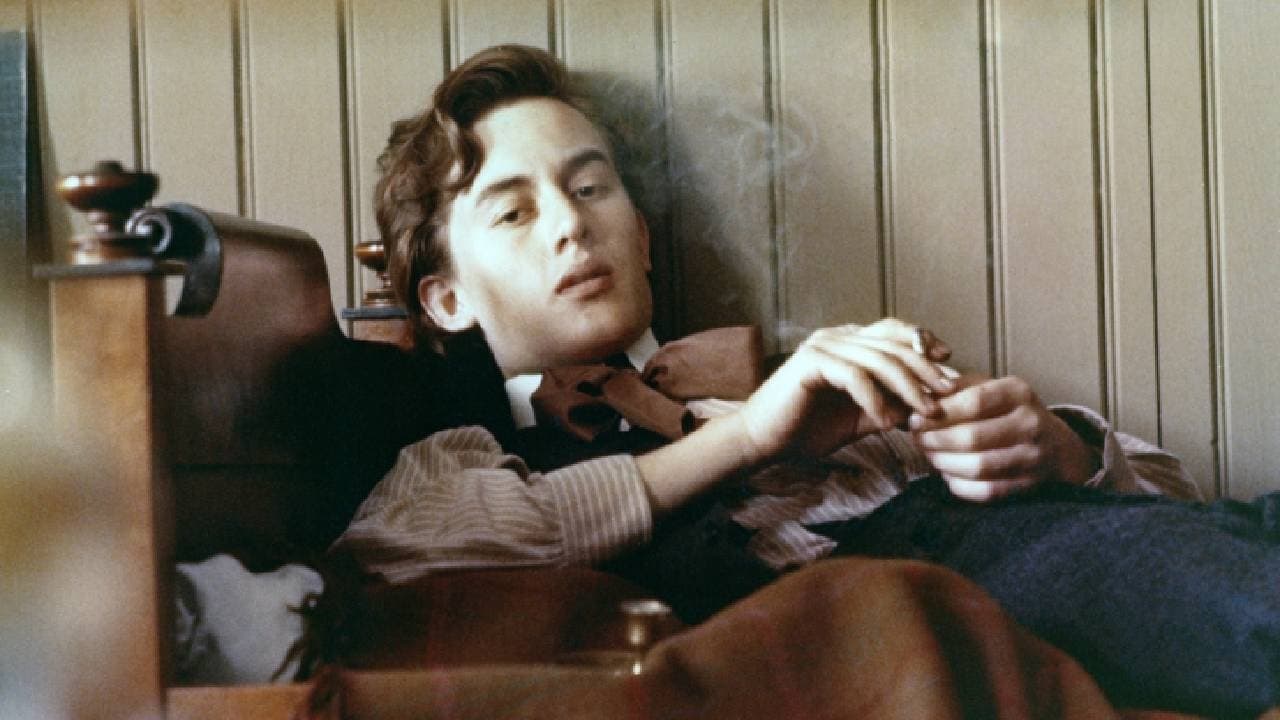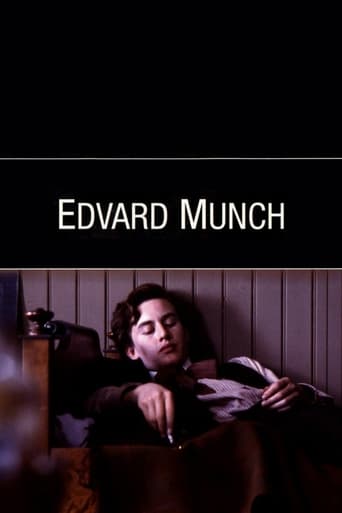

This movie was so-so. It had it's moments, but wasn't the greatest.
... View MoreIt is both painfully honest and laugh-out-loud funny at the same time.
... View MoreIt’s fine. It's literally the definition of a fine movie. You’ve seen it before, you know every beat and outcome before the characters even do. Only question is how much escapism you’re looking for.
... View MoreGreat example of an old-fashioned, pure-at-heart escapist event movie that doesn't pretend to be anything that it's not and has boat loads of fun being its own ludicrous self.
... View MoreIt's an unusual movie, giving us what I assume to be most of the details of the life and work of Edvard Munch, who was responsible for considerably more than a couple of horror movie satires.It's unusually done. I'm not sure I've seen another quite like it. I was unable to sit through the whole movie because, let's face facts, ars longa, vita brevis. Munch grew up in Kristiania, the capital of Norway at the time, and belonged to a class that I think is called shabby genteel. Religious observances were strict and tuberculosis was ubiquitous. Post-puberty, he joined a local group of intellectuals, "the Bohemians," where art and Marxism were common topics. The first painting he produced was of his sister dressed in black. The narration tells us it "drew scorn" but I don't know why. The painting we see in the film isn't an exact replica of the original but both look pretty good to me. (I speak to you as your art expert. Fee: 1 kr.) It reminded me of Bergman's "Scenes From a Marriage." It's really slow. The growing up is slow. The bedding of Mrs. Hager seems to take as long as the Old Stone Age. There are many choker close ups of ordinary faces, mostly just glancing at one another or, sometimes, the camera. Little attention is paid to the fourth wall. Geir Westby, who plays Munch, bears a remarkable resemblance to the model. He has a sweet, shy face with lips that are a little too full. The other actors fit the roles and they're all quite good. Westby in particular does a good job with a demanding part.I found it a little hard to follow. The narration doesn't always match was we're seeing on screen. There are time shifts back and forth. There's a good deal of attention paid to kissing on the neck, a practice that evidently appealed to Munch and was to generate all those etching of vampires. As a matter of fact, I have a postcard of one of those etchings tacked on my wall as we speak. I'm very proud of it. It was stolen from the National Gallery in Washington.Now, if you think because of that last peregrination about a postcard, that I'm confusing you, wait until you watch this movie. And remember, let us not judge others too harshly. Those with peccadilloes should not throw stones.
... View MoreVery interesting and innovative new approach of movie-making. A documentary within a biopic: Norwegian actors representing and picturing Munch, Munch's family, friends, fiends and contemporaries (speaking in Norwegian with subtitles) filmed in a journalistic way, whilst a narrator takes us through in English being sometimes Munch himself or sometimes as an instructor. The chronology of the living facts is juxtaposed by the past with a deep insight of Munch's emotional evolution and disturbances. One does learn a lot about the artist and his oeuvres. Don't expect a motion picture with a plot and you must be interested by Munch himself to be able to enjoy this throughly. Keep in mind that it's 3h30 long. Watchable for adolescents.
... View MoreMunch has long been one of my favorite painters, if not my favorite, since I was seventeen years old. I love films (Angelopoulos, Tarkovsky, Fellini, Antonioni, Bergman, you name it.). Therefore, it was not a hard decision for me to forgo a particularly beautiful afternoon in the outdoors for being locked up for three hours in the AC atmosphere of a movie theater. What a mistake, and what a disappointment! Where was the editor (sorry, it was Watkins) for this film? I am amazed that director/editor Peter Watkins should so obviously confuse the television medium for cinema. The film is about one hour too long. It is repetitive, grossly uneven in its presentation of the painter's life (half-life, would be a more appropriate term). It seems that Watkins went on and on, repeating himself, and suddenly, looking at his watch, realized he had to rush through the remainder of Munch's life to finish the film. He rushed and still did not make it past 1909. Why ignore Munch, the man and his work, after 1909? But I guess this is the director's prerogative, to show what he wants of Munch's life.In general, the cinematography is good, with delicate colors. The representation of the period was well researched and comes across as authentic. The hand-held camera works well most of the time, with beautiful close-ups. In some scenes, such as the socio-political discussions in the cafes, its unsteadiness underlines the chaos of the expounded philosophy. There are even moments of greatness, such as when Munch is painting "Death in the Sickroom." Unfortunately, more often than not, the camera is shaky for no apparent reason. But there are far too many cuts, so many it makes one dizzy at times just watching, and they interfere with the narrative thread of the story. Worse, the contrivance of the cuts is astonishingly predictable -- after a while, I knew that the instant any character's eyes looked directly into the camera, the scene was going to quickly cut to something else. Geir Westby's performance, whose likeness to Munch is remarkable, is not convincing: one does not get any insight regarding Munch's internal demons, or any real sense of the artist's passion, jealousy, and repression. The dreadful environment, familial, social and political, seems practically divorced from Munch's life, as the artist appears to stand apart from it all, an outside observer. His very critical relationship with his father is hardly touched upon, except for a (too often) repeated short scene at the dining table, when Munch was still young. Munch's complex and ambiguous feelings about women in general, which shaped so much of his work, are not even touched upon, except for his particular relationship with Mrs. Heiberg (Gro Fraas). Waltkins' decision to present Munch's biography more like a docu-drama could have been rewarding, except for the fact that he was not able to integrate the historical document with the subject matter.It all boils down to the editing, which is just AWFUL. Believe me, I say this not because the film is three-hours long (Angelopoulos' and Tarkovsky's films do not exactly produce short subjects), but because when a director has nothing new to say, and keeps repeating himself, it quickly becomes tedious and boring. Most likely, the original television production was shown in three one-hour installments. Therefore, many of the numerous flashbacks were justified, not only to somehow refresh the memories of the viewers who might have seen one or two previous episodes in the preceding weeks, but also to "bring aboard" new viewers. But in the continuum of the film, these same flashbacks become useless, even counter-productive, unnecessarily weighing down the viewer with back-story.Please note that I did not follow many of my fellow spectators who left the theatre early. I suffered through to the ending credits.
... View MorePeter Watkins' Edvard Munch is the best film "biography" of an artist I have ever seen. Like Peter Greenaway's THE FALLS (another favorite of mine) it uses non-professionals to great advantage... I'm not quite sure I can say how (other than that I tend to find professional actors distancing, with a few notable exceptions). It also strangely but tantalizingly mixes re-creation with pseudo-interview, creating an emotional tapestry of this lonely man's life which I have never quite been able toUPDATE: ... Not sure why my comment cut off like that!I am re-viewing this great film and find it just as astonishing as I did the first time through. The great _layering_ of image and sound (so that we see an oddly-cut sequence of a couple making love mixed with images of bloody sickbeds, all the while hearing Munch's palette knife scraping away or his distraught sobs) is employed to devastating effect, while the performances seem so naturalistic that it all feels less _acted_ than simply _filmed_ ... as if Watkins somehow managed to transport himself and camera back to 19th century Christiania. Absolutely spellbinding.
... View More